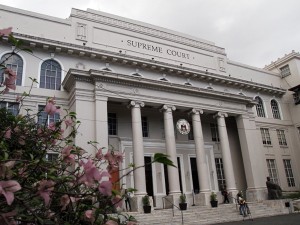MANILA, Philippines–What is the main legal question regarding the Enhanced Defense Cooperation Agreement (Edca)?
What will be debated Tuesday in the Supreme Court is whether the Edca is a treaty or an executive agreement. Both of these bind the Philippine government in its dealings with other governments, but each has different constitutional requirements to become valid. The Philippines has signed the Edca merely as an executive agreement, but the petitioners before the Supreme Court have challenged this.
The Supreme Court has long held that under international law, executive agreements and treaties are practically the same in their ability to bind the Philippine government to an agreement with another government. “[T]here is no difference between treaties and executive agreements in their binding effect upon states concerned,” the court said.
A treaty needs the concurrence of the Senate in order to be valid while an executive agreement needs only the signature of the President or his representative without need of Senate concurrence. The Edca was signed by Defense Secretary Voltaire Gazmin and wasn’t submitted for Senate ratification.
The Constitution says: “No treaty or international agreement shall be valid and effective unless concurred in by at least two-thirds of all the members of the Senate.” However, the Supreme Court has explained that “executive agreements” are not subject to that requirement. “Treaties are formal documents which require ratification by the Senate, while executive agreements become binding through executive action without the need of a vote by the Senate or by Congress.”
A full-fledged treaty is required only when an agreement involves changes in Philippine national policy, and the agreement must therefore be submitted to the Senate for ratification. On the other hand, when an agreement merely implements already existing treaty obligations, laws or policy, an executive agreement will suffice.–Paolo Miguel Q. Bernardo, Contributor



